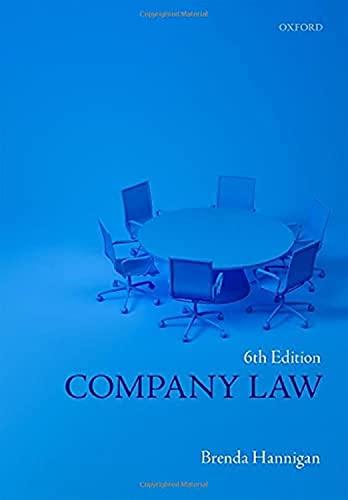Question
Monster Road Equipment Inc, a Canadian company headquartered in Winnipeg, has been very successful in the Australian market. Exports of its heavy road-building equipment have
Monster Road Equipment Inc, a Canadian company headquartered
in Winnipeg, has been very successful in the Australian
market. Exports of its heavy road-building equipment have
been increasing at a very healthy rate. However, the constant
travel to Australia to attend to the marketing and sale of its
products has taken its toll on the marketing manager of Monster
and is diverting too much time from the company's North
American operations and the development of other overseas
markets. Monster decides to appoint an agent in Australia so
that it can continue to expand its market in Australia while
reducing the need for its employees to travel there. Monster
identifies a suitable individual in Sydney, a Mr Foster. The average
cost of a single unit of Monster equipment is Cdn$100,000.
Wanting to authorize Mr Foster to make contracts on Monster's
behalf but not wanting to authorize him to make commitments
that would unduly stretch the company's resources,
Monster decided to limit Mr Foster's authority to contracts having
a value of less than Cdn$400,000 and that contain certain
provisions for the benefit of Monster. The agreement between
Mr Foster and Monster provided for these limitations.
Mr Foster had been Monster's agent for more than two
years, and the relationship had been very satisfactory to both
sides, when Mr Foster was approached by Outback Construction
Co, which had just been awarded a contract to build a new
highway to Alice Springs. Outback required a number of specialized
units to complete the job and negotiated a contract
with Mr Foster for eight units at a total cost of Cdn$824,000.
Mr Foster executed the contract on Monster's behalf, notwithstanding
that it did not comply with Monster's agency agreement
with Mr Foster.
Mr Foster was delighted that he had obtained such a la rge
order, but Monster was already operating at peak capacity
and was unable to deliver the units to Outback on t ime. The
result was that Outback fell behind in its contractual obligations
to complete the new highway on time and sued Monster
for breach of contract- that is, failure to perform to agreed-on
deadlines. Monster defended the case on the basis that t here
was no contract, because Mr Foster had exceeded his actual
authority in agreeing to such a large order. Monster took the
position that Mr Foster was solely responsible for the damages
for breach of contract because he knew about the limitation in
the agency agreement.
In this case, Outback would likely succeed in its claim for
damages against Monster, because Mr Foster was acting within
his apparent authority and Monster had done nothing to inform
Outback, as a third party, of the limitation of authority.
Monster would have a good chance of suing Mr Foster successfully
for breach of a condition of the agency agreement, but Mr
Foster might not have the resources to pay a large judgment.
What do you think Monster could have done to avoid this
unfortunate situation?
Step by Step Solution
There are 3 Steps involved in it
Step: 1

Get Instant Access to Expert-Tailored Solutions
See step-by-step solutions with expert insights and AI powered tools for academic success
Step: 2

Step: 3

Ace Your Homework with AI
Get the answers you need in no time with our AI-driven, step-by-step assistance
Get Started


